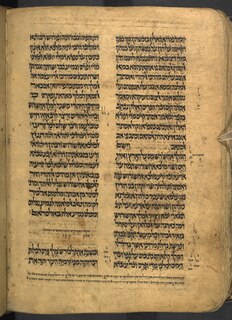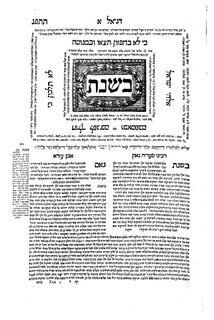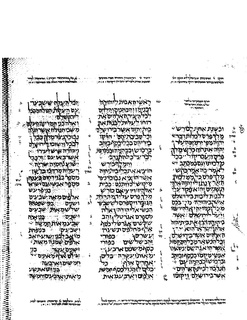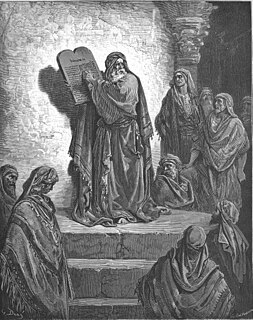 W
WEzra 1 is the first chapter of the Book of Ezra in the Old Testament of the Christian Bible, or the book of Ezra-Nehemiah in the Hebrew Bible, which treats the book of Ezra and book of Nehemiah as one book. Jewish tradition states that Ezra is the author of Ezra-Nehemiah as well as the Book of Chronicles, but modern scholars generally accept that a compiler from the 5th century BCE is the final author of these books. This chapter contains the records of King Cyrus's edict and the initial return of exiles to Judah led by Sheshbazzar as well as the restoration of the sacred temple vessels. It also introduces the section comprising chapters 1 to 6 describing the history before the arrival of Ezra in the land of Judah in 468 BCE. The opening sentence of this chapter is identical to the final sentence of 2 Chronicles.
 W
WEzra 2 is the second chapter of the Book of Ezra in the Old Testament of the Christian Bible, or the book of Ezra-Nehemiah in the Hebrew Bible, which treats the book of Ezra and book of Nehemiah as one book. Jewish tradition states that Ezra is the author of Ezra-Nehemiah as well as the Book of Chronicles, but modern scholars generally accept that a compiler from the 5th century BCE is the final author of these books. The section comprising chapter 1 to 6 describes the history before the arrival of Ezra in the land of Judah in 468 BCE. This chapter contains a list, known as the "Golah List", of the people who returned from Babylon to Judah following Cyrus's edict "by genealogy, family and place of habitation".
 W
WEzra 3 is the third chapter of the Book of Ezra in the Old Testament of the Christian Bible, or the book of Ezra-Nehemiah in the Hebrew Bible, which treats the book of Ezra and book of Nehemiah as one book. Jewish tradition states that Ezra is the author of Ezra-Nehemiah as well as the Book of Chronicles, but modern scholars generally accept that a compiler from the 5th century BCE is the final author of these books. The section comprising chapter 1 to 6 describes the history before the arrival of Ezra in the land of Judah in 468 BCE. This chapter focuses on the people's worship and culminates in the project to rebuild the temple's foundations.
 W
WEzra 4 is the fourth chapter of the Book of Ezra in the Old Testament of the Christian Bible, or the book of Ezra-Nehemiah in the Hebrew Bible, which treats the book of Ezra and book of Nehemiah as one book. Jewish tradition states that Ezra is the author of Ezra-Nehemiah as well as the Book of Chronicles, but modern scholars generally accept that a compiler from the 5th century BCE is the final author of these books. The section comprising chapter 1 to 6 describes the history before the arrival of Ezra in the land of Judah in 468 BCE. This chapter records the opposition of the non-Jews to the re-building of the temple and their correspondence with the kings of Persia which brought a stop to the project until the reign of Darius the Great.
 W
WEzra 5 is the fifth chapter of the Book of Ezra in the Old Testament of the Christian Bible, or the book of Ezra-Nehemiah in the Hebrew Bible, which treats the book of Ezra and book of Nehemiah as one book. Jewish tradition states that Ezra is the author of Ezra-Nehemiah as well as the Book of Chronicles, but modern scholars generally accept that a compiler from the 5th century BCE is the final author of these books. The section comprising chapter 1 to 6 describes the history before the arrival of Ezra to the land of Judah in 468 BCE. This chapter records the contribution of the prophets Haggai and Zechariah to the temple building project and the investigation by Persian officials.
 W
WEzra 6 is the sixth chapter of the Book of Ezra in the Old Testament of the Christian Bible, or the book of Ezra-Nehemiah in the Hebrew Bible, which treats the book of Ezra and book of Nehemiah as one book. Jewish tradition states that Ezra is the author of Ezra-Nehemiah as well as the Book of Chronicles, but modern scholars generally accept that a compiler from the 5th century BCE is the final author of these books. The section comprising chapter 1 to 6 describes the history before the arrival of Ezra in the land of Judah in 468 BCE. This chapter records the response of the Persian court to the report from Tattenai in the previous chapter: a search is made for the original decree by Cyrus the Great and this is confirmed with a new decree from Darius the Great allowing the temple to be built. This chapter closes this first part of the book in a "glorious conclusion with the completion of the new temple and the celebration of Passover" by the people, as their worship life is restored according to the Law of Moses.
 W
WEzra 7 is the seventh chapter of the Book of Ezra in the Old Testament of the Christian Bible, or the book of Ezra-Nehemiah in the Hebrew Bible, which treats the book of Ezra and book of Nehemiah as one book. Jewish tradition states that Ezra is the author of Ezra-Nehemiah as well as the Book of Chronicles, but modern scholars generally accept that a compiler from the 5th century BCE is the final author of these books. The section comprising chapters 7 to 10 mainly describes the activities of Ezra the scribe and the priest. This chapter focuses on the commission of Ezra by Artaxerxes I of Persia, and the start of his journey from Babylon to Jerusalem.
 W
WEzra 8 is the eighth chapter of the Book of Ezra in the Old Testament of the Christian Bible, or the book of Ezra-Nehemiah in the Hebrew Bible, which treats the book of Ezra and book of Nehemiah as one book. Jewish tradition states that Ezra is the author of Ezra-Nehemiah as well as the Book of Chronicles, but modern scholars generally accept that a compiler from the 5th century BCE is the final author of these books. The section comprising chapters 7 to 10 mainly describes of activities of Ezra the scribe and the priest. This chapter follows Ezra’s journey to Jerusalem and includes a genealogy of those returning with him.
 W
WEzra 9 is the ninth chapter of the Book of Ezra in the Old Testament of the Christian Bible, or the book of Ezra-Nehemiah in the Hebrew Bible, which treats the book of Ezra and book of Nehemiah as one book. Jewish tradition states that Ezra is the author of Ezra-Nehemiah as well as the Book of Chronicles, but modern scholars generally accept that a compiler from the 5th century BCE is the final author of these books. The section comprising chapters 7 to 10 mainly describes the activities of Ezra the scribe and the priest. This chapter and the next deal with the problem of intermarriage, starting with the introduction of the crisis, then Ezra’s public mourning and prayer of shame. J. Gordon McConville suggests that this chapter is central to the Book of Ezra because it draws a sharp contrast between what the people of God ought to be and what they actually are.
 W
WEzra 10 is the tenth and final chapter of the Book of Ezra in the Old Testament of the Christian Bible, or the tenth chapter of the book of Ezra-Nehemiah in the Hebrew Bible, which treats the book of Ezra and book of Nehemiah as one book. Jewish tradition states that Ezra is the author of Ezra-Nehemiah as well as the Book of Chronicles, but modern scholars generally accept that a compiler from the 5th century BCE is the final author of these books. The section comprising chapters 7 to 10 mainly describes the activities of Ezra the scribe and the priest. This chapter and the previous one deal with the problem of intermarriage, especially the solution of it, ending with a list of those who sent away their "foreign" wives and children; a somber note which finds relief in the Book of Nehemiah, as the continuation of the Book of Ezra.